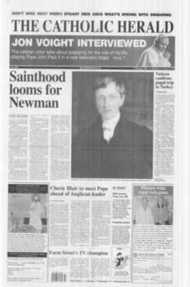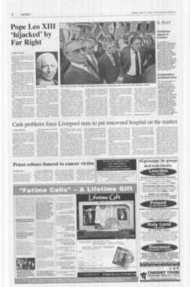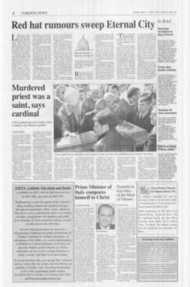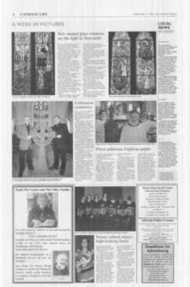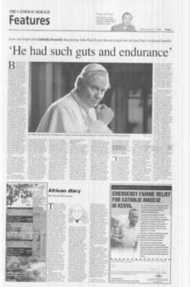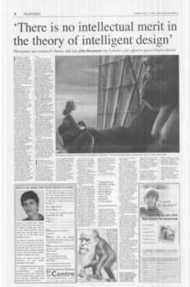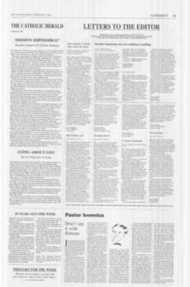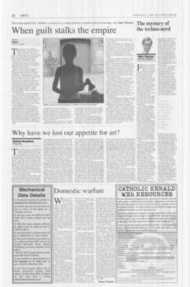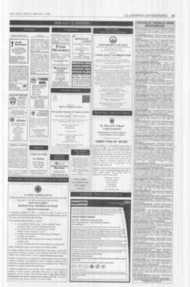Page 10, 17th February 2006
Page 10

Report an error
Noticed an error on this page?If you've noticed an error in this article please click here to report it.
Tags
Share
Related articles
The Strange Case Of An Ecumenism That Would Not Die
A Song Of Praise For The Year Of Grace
The Mission The Church In World Today
New Life In The Church
Laity Consulted On Spiritual Renewal
The Church cannot be
renewed without you
In this new millennium the laity must get used to being asked for their views, says Bishop John Arnold
Isit a perennial problem or a recurring challenge? I mean the task of retaining and promoting the simplicity of the Gospel message in a changing world. Whether we are part of the generation being swept up in the iPod and intemet age or of the generations that built the medieval cathedrals, there is always going to be the task of preserving the image of Christ and his radical demand to love God and neighbour while at the same time incorporating the genius of the age and risking being distracted from true discipleship.
And how might we calculate and measure our success? It seems that no sooner have we steered the Church into a new course, to meet the demands of the present age, than the direction must be considered again and additional changes made. Have we mistaken what we are doing? Are we floundering with uncertainties, and just guessing? There is no doubt that John Paul II laid a timely challenge on the Church when he issued his Apostolic Letter Novo Millennia Ineunte (At the Beginning of the New Millennium) in January 2001. His call was for reflection and a careful consideration, to be made by every diocese around the world. about the tasks that lay before it. It was a chance for each diocese to consider its resources, its principal challenges and strengths and to set its own priorities as we entered the 21st century. There is every reason to ask individual dioceses to embark on this journey of discernment as the answers of even neighbouring dioceses will be so different. Although the task itself was very considerable. the result cannot be "the final word". There will be other decisions to be made, further policy
changes, different initiatives to be undertaken because the Church, as Pope Benedict XVI says, is truly alive — and living things grow and change. But the task is valid because it belongs to every generation to be harnessing the strengths of the age and protecting the fundamental truth of the Gospel.
The method of response to the Pope's invitation would also need to vary. In some cases bishops have felt able to gather with consultors and experts in order to compile a plan for the future, while other dioceses have adopted greater or lesser projects of consultation. In Westminster, the call to reflection and planning came during the first year of office of Cardinal Cormac Murphy-O'Connor and afforded him the opportunity of combining a consultation with his own time of familiarisation with his new diocese, quite different in size and need from his former diocese of Arundel and Brighton.
Consultation does not come easily to the Catholic community as yet. We are probably just not used to being asked. But the era of the Second Vatican Council heralded a new understanding of the vocation of all the baptised and the rights and obligations of all members of the Church. Voicing our opinions and participating in consultation are going to be essential if we are to discern the signs of the times. If we are all parts of the one body, as St Paul suggests in his brilliant imagery, then our diversity of experience and expertise must be harnessed in order to chart our faith journey.
Cardinal Murphy-O'Connor had first asked that the people of Westminster embark on a time of spiritual and pastoral renewal, celebrat
ing five seasons of prayer and faithsharing in a specially devised programme known as At Your Word, Lord. Among the benefits of this initiative came an increased awareness about faith and its role within an individual's choices and decisions as a disciple of Christ. All this was of benefit to many people as we embarked on a second consultation about our vision for the future. What are our strengths as a diocese? What particular challenges do weface? What preparations can we undertake so as to be better equipped for this new millennium'?
The response to questions about our vision for the future were received from individuals and groupsin parishes, from priests, women and men religious, members of new ecclesial movements and from the ethnic chaplaincies which form an ever larger number of the lay faithful in the diocese. These responses were analysed and presented to the Cardinal in the Green Paper, together with some indication as to a vision for our future.
Last week the Cardinal published Communion and Mission. This is his response to the Green Paper and the two years of consultation which had been called "Graced by the Spirit". In the document he outlines five pastoral priorities for the future of the diocese. None of them represents entirely new initiatives. Rather, they reassess the diocese as it is and establish those things that the Cardinal feels are most necessary for our growth in faith at this particular stage of our journey of discipleship.
As the foundation of all our endeavours there is the first priority of enhancing that personal call to holiness that is at the heart of our Christian vocation. We will achieve nothing unless we build on prayer which is centred on the Eucharist and celebrated in liturgies worthy of the mystery they proclaim.
Two further priorities follow immediately from this: the formation of adults and young people, and the promotion of small faith-sharing groups. Both of these priorities are challenges to us all to grow in our knowledge of faith and to see where faith is part of our lived experience and not just something which is learned as a formula and of no practical significance. Christian faith has always concerned the way we live, the activities we undertake and the urgency with which we are pursuing justice and holiness in our lives and the lives of those around us. Faith is not something that we simply learn and then put to one side, but something that develops in our lives, changing with us and becoming the foundation of our own personal vocation.
The Cardinal turns our attention to the specific vocation of priesthood as essential to the life of the Church. In a changing world we need to rediscover the essence of priesthood and assist our priests in their own on-going formation. And to this must be added a stronger culture of vocations which invites young men to consider the possibility of a vocation to the priesthood for themselves.
Finally, the Cardinal addresses the need for appropriate structures which will accommodate and promote change and accountability. To build and celebrate a sense of communion within our Church. as parishes, deaneries and as a diocese will need clear definitions of what we are about and how we each play our significant roles in collaboration with each other.
The document is short. It
provides a framework of the priorities that the Cardinal sees as best employed to promote the Gospel today. And these pages are not listing decisions handed down by the Cardinal and his council. They endorse what the priests and people of the diocese have said about themselves and their own expectations for the future. If all this is to work it will require the commitment on the part of individuals in every parish — each one playing their part in building a sense of community and growing in their own faith and holiness.
This document represents a return to the exhortations of St Paul to those early communities of the Church which spoke of a people centred on Christ in which each individual had an essential part to play. It is certainly a challenge, but it falls to each one of us to make it work.
John Arnold is an Auxiliary Bishop of Westminster
blog comments powered by Disqus


